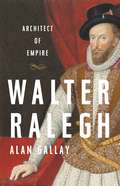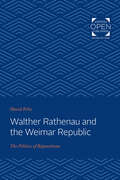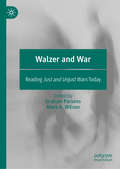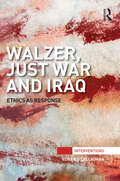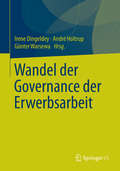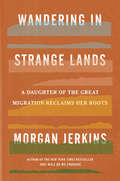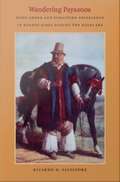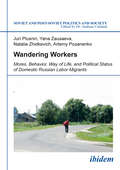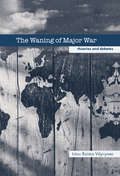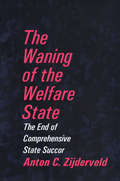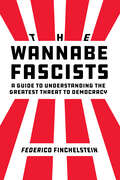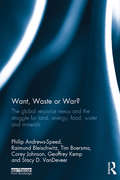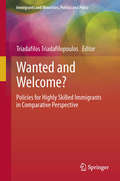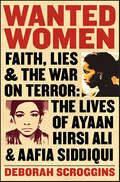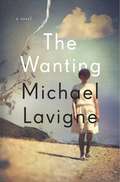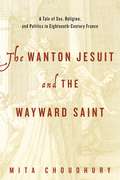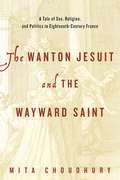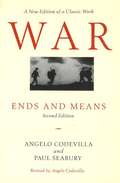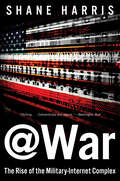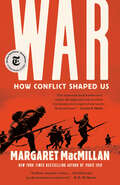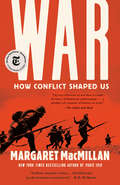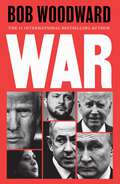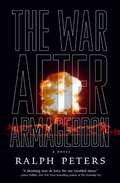- Table View
- List View
Walter Ralegh: Architect of Empire
by Alan GallayFrom a Bancroft Prize-winning historian, a biography of the famed poet, courtier, and colonizer, showing how he laid the foundations of the English EmpireSir Walter Ralegh was a favorite of Queen Elizabeth. She showered him with estates and political appointments. He envisioned her becoming empress of a universal empire. She gave him the opportunity to lead the way. In Walter Ralegh, Alan Gallay shows that, while Ralegh may be best known for founding the failed Roanoke colony, his historical importance vastly exceeds that enterprise. Inspired by the mystical religious philosophy of hermeticism, Ralegh led English attempts to colonize in North America, South America, and Ireland. He believed that the answer to English fears of national decline resided overseas -- and that colonialism could be achieved without conquest. Gallay reveals how Ralegh launched the English Empire and an era of colonization that shaped Western history for centuries after his death.
Walther Rathenau and the Weimar Republic: The Politics of Reparations
by David FelixOriginally published in 1971. Walther Rathenau and the Weimar Republic examines reparations in Germany following the First World War. Financial reparation was the most difficult and dangerous of the conditions imposed upon Germany by the Versailles Treaty. The amount of reparations - three times the country's annual income - was beyond Germany's capacity to pay. The United States, by insisting on the payment of Allied war debts, forced the Allies in turn to insist on reparations. Postwar polemics concentrated on German aggression and war crimes, but the real issue was the damage done to the world's economic mechanism. In the end all nations suffered, including the United States.
Walzer and War: Reading Just and Unjust Wars Today
by Mark A. Wilson Graham ParsonsThis book presents ten original essays that reassess the meaning, relevance, and legacy of Michael Walzer’s classic, Just and Unjust Wars. Written by leading figures in philosophy, theology, international politics and the military, the essays examine topics such as territorial rights, lessons from America’s wars in Iraq and Afghanistan, the practice of humanitarian intervention in light of experience, Walzer’s notorious discussion of supreme emergencies, revisionist criticisms of noncombatant immunity, gender and the rights of combatants, the peacebuilding critique of just war theory, and the responsibility of soldiers for unjust wars. Collectively, these essays advance the debate in this important field and demonstrate the continued relevance of Walzer’s work.
Walzer, Just War and Iraq: Ethics as Response (Interventions)
by Ronan O'CallaghanIn recent years questions of ethical responsibility and justice in war have become increasingly significant in international relations. This focus has been precipitated by United States (U.S.) led invasions in Afghanistan and Iraq. In turn, Western conceptions of ethical responsibility have been largely informed by human rights based understandings of morality. This book directly addresses the question of what it means to act ethically in times of war by drawing upon first-hand accounts of U.S. war fighting in Iraq during the 2003 invasion and occupation. The book focuses upon the prominent rights based justification of war of Michael Walzer. Through an in-depth critical reading of Walzer’s work, this title demonstrates the broader problems implicit to human rights based justifications of war and elucidates an alternative account of ethical responsibility: ethics as response. Putting forward a compelling case for people to remain troubled and engaged with questions of ethical responsibility in war, this work will be of great interest to students and scholars in a range of areas including international relations theory, ethics and security studies.
Wandel der Governance der Erwerbsarbeit
by Irene Dingeldey André Holtrup Günter WarsewaUnter dem Leitbegriff ,,Governance von Arbeit" analysieren die AutorInnen Veränderungen und Kontinuitäten in Bezug auf die Gestaltung von Arbeitsbedingungen und Karriereentwicklung, Entlohnung und Interessenvertretung, wie auch Institutionen der Reproduktion (Berufsbildung, Familie) in Deutschland. Übergreifende These ist, dass sich alte und neue Institutionen im Sinne veränderter Komplementaritäten verbinden und sowohl individuelle als auch kollektive Akteure veranlassen, z. T. neue, eigene Bewältigungs- und Entlastungsstrategien zu entwickeln. Die sozialen Folgen dieser Entwicklung werden als ,,bipolare Heterogenisierung" skizziert, d. h. dass jenseits des traditionellen Kerns, der nach wie vor durch Normalarbeitsverhältnis, Normalbiographie und Normalfamilie geprägt ist, eine zunehmende Polarisierung der Arbeits- und Lebensbedingungen in Richtung Privilegierung und Prekarisierung zu erkennen ist.
Wandering in Strange Lands: A Daughter of the Great Migration Reclaims Her Roots
by Morgan JerkinsNamed one of the most anticipated books of the year by ELLE, Buzzfeed, Esquire, Bitch Media, Good Housekeeping, Electric Literature, Parade and BookRiot “One of the smartest young writers of her generation.”—Book RiotFrom the acclaimed cultural critic and New York Times bestselling author of This Will Be My Undoing—a writer whom Roxane Gay has hailed as “a force to be reckoned with”—comes this powerful story of her journey to understand her northern and southern roots, the Great Migration, and the displacement of black people across America.Between 1916 and 1970, six million black Americans left their rural homes in the South for jobs in cities in the North, West, and Midwest in a movement known as The Great Migration. But while this event transformed the complexion of America and provided black people with new economic opportunities, it also disconnected them from their roots, their land, and their sense of identity, argues Morgan Jerkins. In this fascinating and deeply personal exploration, she recreates her ancestors’ journeys across America, following the migratory routes they took from Georgia and South Carolina to Louisiana, Oklahoma, and California. Following in their footsteps, Jerkins seeks to understand not only her own past, but the lineage of an entire group of people who have been displaced, disenfranchised, and disrespected throughout our history. Through interviews, photos, and hundreds of pages of transcription, Jerkins braids the loose threads of her family’s oral histories, which she was able to trace back 300 years, with the insights and recollections of black people she met along the way—the tissue of black myths, customs, and blood that connect the bones of American history. Incisive and illuminating, Wandering in Strange Lands is a timely and enthralling look at America’s past and present, one family’s legacy, and a young black woman’s life, filtered through her sharp and curious eyes.
Wandering Paysanos: State Order and Subaltern Experience in Buenos Aires During the Rosas Era
by Ricardo D. SalvatoreA pioneering examination of the experiences of peasants and peons, or paysanos, in the Buenos Aires province during Juan Manuel de Rosas's regime (1829-1852), Wandering Paysanos is one of the first studies to consider Argentina's history from a subalternist perspective. The distinguished Argentine historian Ricardo D. Salvatore situates the paysanos as mobile job seekers within an expanding, competitive economy as he highlights the points of contention between the peasants and the state: questions of military service, patriotism, crime, and punishment. He argues that only through a reconstruction of the different subjectivities of paysanos--as workers, citizens, soldiers, and family members--can a new understanding of postindependence Argentina be achieved. Drawing extensively on judicial and military records, Salvatore reveals the state's files on individual prisoners and recruits to be surprisingly full of personal stories directly solicited from paysanos. While consistently attentive to the fragmented and mediated nature of these archival sources, he chronicles how peons and peasants spoke to power figures--judges, police officers, and military chiefs--about issues central to their lives and to the emerging nation. They described their families and their wanderings across the countryside in search of salaried work, memories and impressions of the civil wars, and involvement with the Federalist armies. Their lamentations about unpaid labor, disrespectful government officials, the meaning of poverty, and the dignity of work provide vital insights into the contested nature of the formation of the Argentine Confederation. Wandering Paysanos discloses a complex world until now obscured--that of rural Argentine subalterns confronting the state.
Wandering Workers: Mores, Behavior, Way of Life, and Political Status of Domestic Russian Labor Migrants (Soviet and Post-Soviet Politics and Society #141)
by Juri Plusnin Yana Zausaeva Natalia Zhidkevich Artemy PozanenkoThis timely book offers a fresh perspective on the issue of contemporary migratory labor, otkhodnichestvo, in Russia—the temporary departure of inhabitants from small towns and villages for short-term jobs in the major cities of Russia. Although otkhodnichestvo is a mass phenomenon, it is not reflected in official economic statistics. Based on numerous interviews with otkhodniks and local experts, this stunningly original work focuses on the central and northern regions of European Russia. The authors draw a social portrait of the contemporary otkhodnik and offer a sociological assessment of the economic and political status these "wandering workers" live with.
The Waning of Major War: Theories and Debates (Contemporary Security Studies)
by Raimo VäyrynenThis book is a systematic effort by leading international scholars to map the trends in major-power warfare and explore whether it is waxing or waning. The main point of departure is that major-power war as a historical institution is in decline. This does not mean, though, that wars between states are in general disappearing. While there is some convergence in the conclusions by individual authors, they are by no means unanimous about the trend. The articles explore different causes and correlates of the declining trend in major-power warfare, including the impact of the international structure, nuclear weapons, international law, multilateral institutions, sovereignty and value changes.
The Waning of the Welfare State
by Anton ZijderveldThe welfare state in postwar Western Europe has been extended and intensified in a spectacular manner. Today, "welfare" represents a complex mix of services covering health, education, welfare, the arts, leisure, and social security. Anton C. Zijderveld is of the opinion that Europe's vast, comprehensive welfare state is becoming leaner and meaner, heading down a more sober path toward decentralization and deregulation, which only, but not merely, secures order for its citizens and shields society's vulnerable. As the millennium approaches, Zijderveld believes Europe is experiencing a cultural renaissance and a socioeconomic and political reformation in which the market will flourish and civil society will prosper.The Waning of the Welfare State focuses on the transformation of the welfare state in Europe over a four-decade period. Zijderveld employs the democratic triangle theoretical model, in which democracy is viewed as a system in which state, market, and civil society are held in precious balance. If one component supersedes the other two, democracy is endangered. In its 1960s and 1970s heyday, the state took center stage at the expense of the market and civil society; social democracy was the prevailing ideology. In the 1980s the market triumphed, often at the expense of both the state and civil society; this was the decade of liberalism. Today, civil society prevails, albeit at risk of being injurious to state and market. Ideologically, this is the decade of conservatism.Zijderveld sees a future "Americanization" of European social policy producing a fortuitously balanced coalition of social democracy, liberalism, and conservatism; a place where safety and order, prosperity and economic participation, and social participation and meaningful interactions flourish equally. This transformation carries many risks. But it will, in the end, strengthen Europe's political, economic, and sociocultural stamina. If it also draws the Atlantic partners closer together, as Zijderveld believes it does, the chances of another European communist, libertarian, or fascist Gtterdommerung will remain remote. Zijderveld presents useful concepts in a highly organized fashion. He has produced a very important book for American readers who will, hopefully, discover, beyond the often vast differences, some basic similarities of structures and developments within the European welfare state.
The Wannabe Fascists: A Guide to Understanding the Greatest Threat to Democracy
by Federico FinchelsteinMeet today's almost fascists and learn the warning signs to intercept them on the road from populism to dictatorship. With The Wannabe Fascists, historian Federico Finchelstein offers a precise explanation of why Trumpism and similar movements across the world belong to a new political breed, the last outcome of the combined histories of fascism and populism: the wannabe fascists. This new type of populist politician is typically a legally elected leader who, unlike previous populists who were eager to distance themselves from fascism, turns to totalitarian lies, racism, and illegal means to destroy democracy from within. Drawing on almost three decades of research on the histories of fascism and populism around the world, this book lays out in clear language what the author calls the "four pillars of fascism"—xenophobia, propaganda, political violence, and ultimately dictatorship. Finchelstein carefully explains how and why wannabe fascists like Trump, Bolsonaro, and Modi embrace the first three pillars but don't quite succeed in dictatorship and total suppression of the popular vote. The Wannabe Fascists stresses the importance of preventing despots from reaching this tipping point and offers a clear warning for what's at stake.
Want, Waste or War?: The Global Resource Nexus and the Struggle for Land, Energy, Food, Water and Minerals (Earthscan Studies in Natural Resource Management)
by Geoffrey Kemp Raimund Bleischwitz Philip Andrews-Speed Stacy D. VanDeveer Tim Boersma Corey JohnsonIn addition to environmental change, the structure and trends of global politics and the economy are also changing as more countries join the ranks of the world’s largest economies with their resource-intensive patterns. The nexus approach, conceptualized as attention to resource connections and their governance ramifications, calls attention to the sustainability of contemporary consumer resource use, lifestyles and supply chains. This book sets out an analytical framework for understanding these nexus issues and the related governance challenges and opportunities. It sheds light on the resource nexus in three realms: markets, interstate relations and local human security. These three realms are the organizing principle of three chapters, before the analysis turns to crosscutting case studies including shale gas, migration, lifestyle changes and resource efficiency, nitrogen fertilizer and food systems, water and the Nile Basin, climate change and security and defense spending. The key issues revolve around competition and conflict over finite natural resources. The authors highlight opportunities to improve both the understanding of nexus challenges and their governance. They critically discuss a global governance approach versus polycentric and multilevel approaches and the lack of those dimensions in many theories of international relations.
Wanted and Welcome?
by Triadafilos TriadafilopoulosThis book considers the origins, performance and diffusion of national immigration policies targeting highly skilled immigrants. Unlike asylum seekers and immigrants admitted under family reunification streams, highly skilled immigrants are typically cast as "wanted and welcome" as a consequence of their potential economic contribution to the receiving society and putative assimilability. Testing the degree to which this assumption holds is the principle aim of this book. In contrast to publications which see highly skilled immigration as functional response to labor market needs, the book probes the political and sociological dimensions of policy, drawing on contributions from an international group of established and new scholars from the fields of history, law, political science, sociology, and public policy. The book is organized into four parts. Part I probes the origins of post-WWII immigration policies in Canada, Australia, and the United States. Part II analyzes recent debates on highly skilled immigration policy in the United States, whose origins go back to the 1965 Act by Congress which favored family reunification over skilled immigration. Part III considers the degree to which highly skilled immigrants are welcome, by focusing on the integration trajectories of foreign trained professionals in Canada. Paradoxically, just as Canada has succeeded in orienting its admissions system more explicitly toward privileging highly educated and skilled professionals, highly skilled immigrants have experienced worsening economic outcomes as reflected in rates of unemployment and falling earnings. Part IV considers the internationalization of highly skilled immigration policies, focusing on Europe's most important immigration countries, Germany and Britain. As is true in Canada, the labor market outcomes for highly skilled immigrants in Europe are disappointing, and the final chapter discusses why this is the case and what might be done to improve matters. Given its combination of cross-disciplinary insights, cross-national comparisons, and empirical richness, the book will be of interest to both scholars and policymakers concerned with immigration policy.
Wanted Women: Faith, Lies, and the War on Terror: The Lives of Ayaan Hirsi Ali and Aafia Siddiqui
by Deborah ScrogginsThe author of Emma’s War offers a compelling account of the link between Muslim women’s rights, Islamist opposition to the West, and the Global War on Terror.Wanted Women explores the experiences of two fascinating female champions from opposing sides of the conflict: Islam critic Ayaan Hirsi Ali and neuroscientist Aafia Siddiqui. With Emma’s War: An Aid Worker, A Warlord, Radical Islam and the Politics of Oil, journalist Deborah Scroggins achieved major international acclaim; now, in Wanted Women, Scroggins again exposes a crucial untold story from the center of an ongoing ideological war—laying bare the sexual and cultural stereotypes embraced by both sides of a conflict that threatens to engulf the world.
The Wanting: A Novel
by Michael LavigneFrom the author of Not Me, this powerful novel about an Israeli father and his daughter brings to life a rich canvas of events and unexpected change in the aftermath of a suicide bombing. In the galvanizing opening of The Wanting, the celebrated Russian-born postmodern architect Roman Guttman is injured in a bus bombing, causing his life to swerve into instability and his perceptions to become heightened and disturbed as he embarks on an ill-advised journey into Palestinian territory. The account of Roman's desert odyssey alternates with the vivacious, bittersweet diary of his thirteen-year-old daughter, Anyusha (who is on her own perilous path, of which Roman is ignorant), and the startlingly alive witnessings of Amir, the young Palestinian who pushed the button and is now damned to observe the havoc he has wrought from a shaky beyond. Enriched by flashbacks to the alluringly sad tale of Anyusha's mother, a famous Russian refusenik who died for her beliefs, The Wanting is a poignant study of the costs of extremism, but it is most satisfying as a story of characters enmeshed in their imperfect love for one another and for the heartbreakingly complex world in which that love is wrought.
The Wanton Jesuit and the Wayward Saint: A Tale of Sex, Religion, and Politics in Eighteenth-Century France
by Mita ChoudhuryThis microhistory investigates the famous and scandalous 1731 trial in which Catherine Cadière, a young woman in the south of France, accused her Jesuit confessor, Jean-Baptiste Girard, of seduction, heresy, abortion, and bewitchment. Generally considered to be the last witchcraft trial in early modern France, the Cadière affair was central to the volatile politics of 1730s France, a time when magistrates and lawyers were seeking to contain clerical power. Mita Choudhury’s examination of the trial sheds light on two important phenomena with broad historical implications: the questioning of traditional authority and the growing disquiet about the role of the sacred and divine in French society. Both contributed to the French people’s ever-increasing disenchantment with the church and the king. Choudhury builds her story through an extensive examination of archival material, including trial records, pamphlets, periodicals, and unpublished correspondence from witnesses. The Wanton Jesuit and the Wayward Saint offers new insights into how the eighteenth-century public interpreted the accusations and why the case consumed the public for years, developing from a local sex scandal to a referendum on religious authority and its place in French society and politics.
The Wanton Jesuit and the Wayward Saint: A Tale of Sex, Religion, and Politics in Eighteenth-Century France (Refiguring Modernism Ser. #22)
by Mita ChoudhuryThis microhistory investigates the famous and scandalous 1731 trial in which Catherine Cadière, a young woman in the south of France, accused her Jesuit confessor, Jean-Baptiste Girard, of seduction, heresy, abortion, and bewitchment. Generally considered to be the last witchcraft trial in early modern France, the Cadière affair was central to the volatile politics of 1730s France, a time when magistrates and lawyers were seeking to contain clerical power. Mita Choudhury’s examination of the trial sheds light on two important phenomena with broad historical implications: the questioning of traditional authority and the growing disquiet about the role of the sacred and divine in French society. Both contributed to the French people’s ever-increasing disenchantment with the church and the king. Choudhury builds her story through an extensive examination of archival material, including trial records, pamphlets, periodicals, and unpublished correspondence from witnesses. The Wanton Jesuit and the Wayward Saint offers new insights into how the eighteenth-century public interpreted the accusations and why the case consumed the public for years, developing from a local sex scandal to a referendum on religious authority and its place in French society and politics.
The Wanton Jesuit and the Wayward Saint: A Tale of Sex, Religion, and Politics in Eighteenth-Century France
by Mita ChoudhuryThis microhistory investigates the famous and scandalous 1731 trial in which Catherine Cadière, a young woman in the south of France, accused her Jesuit confessor, Jean-Baptiste Girard, of seduction, heresy, abortion, and bewitchment. Generally considered to be the last witchcraft trial in early modern France, the Cadière affair was central to the volatile politics of 1730s France, a time when magistrates and lawyers were seeking to contain clerical power. Mita Choudhury’s examination of the trial sheds light on two important phenomena with broad historical implications: the questioning of traditional authority and the growing disquiet about the role of the sacred and divine in French society. Both contributed to the French people’s ever-increasing disenchantment with the church and the king. Choudhury builds her story through an extensive examination of archival material, including trial records, pamphlets, periodicals, and unpublished correspondence from witnesses. The Wanton Jesuit and the Wayward Saint offers new insights into how the eighteenth-century public interpreted the accusations and why the case consumed the public for years, developing from a local sex scandal to a referendum on religious authority and its place in French society and politics.
War: Ends and Means (2nd edition)
by Angelo Codevilla Paul SeaburyThis book explores the causes, operations, endings, and justifications of war. In the process, it demolishes many currently fashionable illusions, such as that peace is always preferable to war, that wars occur because of accidents or misunderstandings, and that technology changes the nature of war. Abundant historical and contemporary examples show, the authors contend, that all wars are deliberate political choices, that military operations follow timeless principles, and that, as Aristotle taught, the natural aim of war is victory. This new edition of the book that Eugene Rostow called “a gem,” Michael Howard called “shrewd and trenchant,” and Library Journal called “persuasive” devotes substantial attention to the wars of the post–Cold War period, including “the war on terrorism.”
@War: The Rise of the Military-Internet Complex
by Shane Harris"Chilling . . . Extraordinary and urgent." — Washington Post &“Scary but well documented . . . A deep dive into the world of cyber war and cyber warriors.&” — Los Angeles Times &“Unsettling . . . A deeply informative account of how corporations, governments, and even individuals are rapidly perfecting the ability to monitor and sabotage the Internet infrastructure.&” — Christian Science MonitorThe wars of the future are already being fought today. The United States military currently views cyberspace as the &“fifth domain&” of warfare (alongside land, air, sea, and space), and the Department of Defense, the National Security Agency, and the CIA all field teams of hackers who can, and do, launch computer virus strikes against enemy targets. As recent revelations have shown, government agencies are joining with tech giants like Google and Facebook to collect vast amounts of information, and the military has also formed a new alliance with tech and finance companies to patrol cyberspace. Shane Harris offers a deeper glimpse into this partnership than we have ever seen before, and he explains what the new cyber security regime means for all of us who spend our daily lives bound to the Internet—and are vulnerable to its dangers.&“@War is superb . . . Rigorous, comprehensive, and a joy to read.&” — Lawfare
War: How Conflict Shaped Us
by Margaret MacMillanIs peace an aberration? <P><P>The bestselling author of Paris 1919 offers a provocative view of war as an essential component of humanity. <P><P> The instinct to fight may be innate in human nature, but war—organized violence—comes with organized society. War has shaped humanity’s history, its social and political institutions, its values and ideas. Our very language, our public spaces, our private memories, and some of our greatest cultural treasures reflect the glory and the misery of war. War is an uncomfortable and challenging subject not least because it brings out both the vilest and the noblest aspects of humanity. <P><P>Margaret MacMillan looks at the ways in which war has influenced human society and how, in turn, changes in political organization, technology, or ideologies have affected how and why we fight. War: How Conflict Shaped Us explores such much-debated and controversial questions as: When did war first start? Does human nature doom us to fight one another? Why has war been described as the most organized of all human activities? Why are warriors almost always men? Is war ever within our control? <P><P>Drawing on lessons from wars throughout the past, from classical history to the present day, MacMillan reveals the many faces of war—the way it has determined our past, our future, our views of the world, and our very conception of ourselves.
War: How Conflict Shaped Us
by Margaret MacMillanThoughtful and brilliant insights into the very nature of war--from the ancient Greeks to modern times--from world-renowned historian Margaret MacMillan. War--its imprint in our lives and our memories--is all around us, from the metaphors we use to the names on our maps. As books, movies, and television series show, we are drawn to the history and depiction of war. Yet we nevertheless like to think of war as an aberration, as the breakdown of the normal state of peace. This is comforting but wrong. War is woven into the fabric of human civilization. In this sweeping new book, international bestselling author and historian Margaret MacMillan analyzes the tangled history of war and society and our complicated feelings towards it and towards those who fight. It explores the ways in which changes in society have affected the nature of war and how in turn wars have changed the societies that fight them, including the ways in which women have been both participants in and the objects of war.MacMillan's new book contains many revelations, such as war has often been good for science and innovation and in the 20th century it did much for the position of women in many societies. But throughout, it forces the reader to reflect on the ways in which war is so intertwined with society, and the myriad reasons we fight.
War
by Bob WoodwardChosen by WATERSTONES as one of their BEST POLITICS BOOKS of 2024 Two-time Pulitzer prize winner Bob Woodward tells the revelatory, behind-the-scenes story of three wars – Ukraine, the Middle East and the struggle for the American presidency.War is an intimate and sweeping account of one of the most tumultuous periods in presidential politics and American history. We see President Joe Biden and his top advisers in tense conversations with Russian president Vladimir Putin, Israeli prime minister Benjamin Netanyahu and Ukrainian president Volodymyr Zelensky. We also see Donald Trump, conducting a shadow presidency and seeking to regain political power. With unrivalled, inside-the-room reporting, Woodward shows President Biden&’s approach to managing the war in Ukraine, the most significant land war in Europe since World War II, and his tortured path to contain the bloody Middle East conflict between Israel and the terrorist group Hamas. Woodward reveals the extraordinary complexity and consequence of wartime back-channel diplomacy and decision-making to deter the use of nuclear weapons and a rapid slide into World War III. The raw cage-fight of politics accelerates as Americans prepare to vote in 2024, starting between President Biden and Trump, and ending with the unexpected elevation of Vice President Kamala Harris as the Democratic nominee for president.War provides an unvarnished examination of the vice president as she tries to embrace the Biden legacy and policies while beginning to chart a path of her own as a presidential candidate. Woodward&’s reporting once again sets the standard for journalism at its most authoritative and illuminating.
War
by Bob WoodwardTwo-time Pulitzer Prize winner Bob Woodward tells the revelatory, behind-the-scenes story of three wars—Ukraine, the Middle East and the struggle for the American Presidency. War is an intimate and sweeping account of one of the most tumultuous periods in presidential politics and American history. We see President Joe Biden and his top advisers in tense conversations with Russian president Vladimir Putin, Israeli prime minister Benjamin Netanyahu and Ukrainian president Volodymyr Zelensky. We also see Donald Trump, conducting a shadow presidency and seeking to regain political power. With unrivaled, inside-the-room reporting, Woodward shows President Biden&’s approach to managing the war in Ukraine, the most significant land war in Europe since World War II, and his tortured path to contain the bloody Middle East conflict between Israel and the terrorist group Hamas. Woodward reveals the extraordinary complexity and consequence of wartime back-channel diplomacy and decision-making to deter the use of nuclear weapons and a rapid slide into World War III. The raw cage-fight of politics accelerates as Americans prepare to vote in 2024, starting between President Biden and Trump, and ending with the unexpected elevation of Vice President Kamala Harris as the Democratic nominee for president. War provides an unvarnished examination of the vice president as she tries to embrace the Biden legacy and policies while beginning to chart a path of her own as a presidential candidate. Woodward&’s reporting once again sets the standard for journalism at its most authoritative and illuminating.
The War After Armageddon
by Ralph PetersShocking scenes of battle... unforgettable soldiers... heartbreaking betrayals... In this stunning, fast-paced novel, a ruthless future war unfolds in a 21st century nightmare: Los Angeles is a radioactive ruin; Europe lies bleeding; and Israel has been destroyed... with millions slaughtered. A furious America fights to reclaim the devastated Holy Land. The Marines storm ashore; the U. S. Army does battle in a Biblical landscape. Hi-tech weaponry is useless and primitive hatreds flare. Lt. Gen. Gary Flintlock Harris and his courageous warriors struggle for America's survival, with ruthless enemies to their front and treachery at their rear. Islamist fanatics, crusading Christians, and unscrupulous politicians open the door to genocide. The War After Armageddon thrusts the reader into a terrifying future in which all that remains is the horror of war, and the inspiration of individual heroism. A master at bringing to life the eternal soldier, Ralph Peters tells a riveting tale that honors those Americans who fight and sacrifice all for a dream of freedom.
